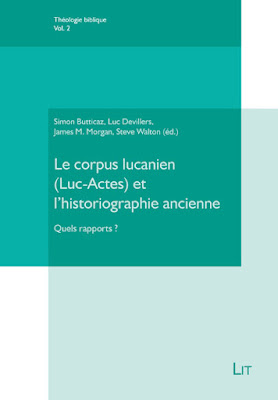We are happy to announce the publication of contributions to our international colloquium on Luke-Acts and ancient historiography, which took place at the University of Fribourg in September 2017 (see program).
Book description:
 English: In biblical research, consensus is rare. Formulated by Dibelius at the beginning of the 20th century, the thesis that Luke is “the first Christian historian” is one such. Among the authors of the New Testament, Luke is alone in tracing the future of the Church after Easter, composing a two-volume work (B.W. Bacon ; H.J. Cadbury). If this action is original, it does not escape influences from ancient historiography. It is to explore these links that this volume is dedicated.
English: In biblical research, consensus is rare. Formulated by Dibelius at the beginning of the 20th century, the thesis that Luke is “the first Christian historian” is one such. Among the authors of the New Testament, Luke is alone in tracing the future of the Church after Easter, composing a two-volume work (B.W. Bacon ; H.J. Cadbury). If this action is original, it does not escape influences from ancient historiography. It is to explore these links that this volume is dedicated.
French: Dans la recherche biblique, les consensus sont rares. Formulée par Dibelius au début du xxe siècle, la thèse qui fait de Luc « le premier historien chrétien » en est un. Dans le Nouveau Testament en effet, l’auteur à Théophile est le seul à retracer le devenir de l’Eglise au lendemain de Pâques, composant une œuvre en deux tomes : « Luc-Actes » (B.W. Bacon ; H.J. Cadbury). Si ce geste est original, il n’échappe toutefois pas aux influences et dépendances face aux pratiques anciennes d’écriture. C’est à explorer ces liens que se consacre le présent volume, fruit d’un colloque organisé en 2017 à Fribourg. Entre reprises et développements des modèles et pratiques littéraires de l’Antiquité, l’écriture de Luc,
l’historien, est ainsi profilée.
To order this book: go to
Amazon or LIT Verlag
Abstract of my contribution:
Daniel Marguerat describes Saint Luke's writings as being at the crossroads of two historiographies, Jewish and Greek. Indeed, Luke helped to clear a new road of historiography, which is both Greek and Jewish and without any apparent complex about it. In fact, the way Luke brings these two roads together is multidimensional. One key aspect is through his representation of the divine in a fresh way that brings the two roads together in order to make sense of the past, for the interest and benefit of an international audience. This manner of writing history may be considered a subgenre, ‘prophetic historiography’, one that includes the divine from the historian’s own worldview as a central part of the narrative’s argumentation. This essay then proposes this subgenre as a research tool for exploring historians with a retrospective prophetic role in their own societies. This conceptual link is a key part of a broader writing project that explores this history-writing sans complexe as manifest in the writings of two fathers of historiography, Herodotus and Luke. In the latter part of the article, it will be suggested that Luke sought not only to imitate the tradition that Herodotus established, but also to culminate effectively Jewish and Greek historiographical traditions.
Morgan, James, "Prophetic historiography: Definition and relevance for Herodotean and Lukan research" in
Le corpus lucanien (Luc-Actes) et l’historiographie ancienne : quels rapports ?, S. Butticaz, L. Devillers, J. M. Morgan et S. Walton (sous dir.), Zurich, LIT, 2019, 69–95.

